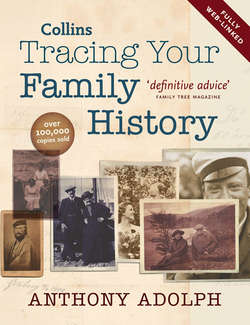Читать книгу Collins Tracing Your Family History - Ryan Tubridy, Anthony Adolph - Страница 19
A FEW FACTS
ОглавлениеThe only dates in the oral history were for Mbari, who was chief of his tribe from 1795 to 1797, and Katowa, who was chief 1450-97. The earliest ancestor, Mukunti-Muora, supposedly lived 4000 years ago. One thousand would be more realistic, and to get back from 1795 to 1450 in five generations is stretching it. There may, then, be some omissions of generations, or misremembered facts, but that makes this no different to the earliest oral pedigrees of the British Isles, which stretch back to Arthur, Brutus of Troy and the god Woden. This does not detract from their immense value because they undoubtedly do record the names of ancestors who really lived, and who are not recorded in any other fashion. Lose the oral history and these ancient memories will vanish irrevocably.
Such traditions should be treated with the greatest respect, but it is unrealistic to imagine that they can be strictly accurate. When using oral history as the basis for original, record-based research, you mustn’t be surprised if you find names, dates or places are given slightly (or sometimes wildly) inaccurately. I sometimes get my own age wrong by a year (I certainly can’t remember my telephone number all the time), so you should be prepared for this and, if you do not find what you are looking for under Thompson in 1897, see if what you want isn’t listed under Thomson in 1898 instead.
Family papers: lists of children’s dates of birth and baptism were often kept by families, especially before the start of General Registration in 1837.
In fact, you can’t trace a record-based family tree properly without developing a healthy scepticism for anything you are told, or indeed anything you read. There are deceptions and lies, of course. One family I helped, who were called Newman, discovered their ancestor had faked his own suicide and started a new life – as a ‘new man’, his original name having been something completely different. More often, though, discrepancies and inaccuracies arise through simple mistakes or lapses of memory. ‘Granny would never lie,’ said one client of mine, ‘so that birth certificate must be wrong.’ No, Granny didn’t lie, she just got her age slightly wrong. There’s a real difference.
Indeed, recording oral history often relies on interviewing the elderly. Sometimes, it’s the only time very old people have any proper attention paid to them, so be indulgent if they don’t reel out exactly what you want in ten minutes flat. Letter, telephone and email can all help you gain valuable information from your relatives, but if you can visit them, so much the better. It may seem a bind, but it’s often worth it and will become part of your store of memories to pass on to later generations. I once went all the way to Tours in France to visit Lydia Renault, a cousin of my mother’s. I arrived at 11am and, whereas her English relations would have offered me tea and some ghastly old biscuits, Lydia suggested whisky and Coca-Cola, which we drank on her balcony, overlooking the Loire, while she regaled me with tales of her family at the start of the 20th century.
